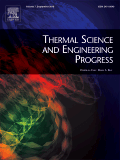
Thermal Science and Engineering Progress
Scope & Guideline
Elevating the standards of thermal science and engineering.
Introduction
Aims and Scopes
- Thermal Energy Management:
Research related to the optimization and management of thermal energy systems, including heating and cooling applications, energy storage solutions, and waste heat recovery. - Heat Transfer Technologies:
Studies focused on enhancing heat transfer processes, including experimental and computational investigations into heat exchangers, thermal interfaces, and phase change materials. - Renewable Energy Systems:
Exploration of renewable energy technologies such as solar thermal systems, biomass energy conversion, and hybrid energy systems, emphasizing their thermal performance and efficiency. - Numerical Simulation and Modeling:
Development and application of numerical models for simulating thermal phenomena in various systems, including computational fluid dynamics (CFD) and advanced heat transfer modeling techniques. - Innovative Materials and Nanotechnology:
Research on nanomaterials and composites aimed at improving thermal properties and performance in thermal applications, including phase change materials and nanofluids. - Sustainability and Environmental Impact:
Investigations into the environmental aspects of thermal energy systems, focusing on energy efficiency, emissions reduction, and the integration of sustainable practices in thermal engineering.
Trending and Emerging
- Hybrid Energy Systems:
There is a growing trend in research on hybrid energy systems that combine different energy sources, such as solar and biomass, to optimize energy production and reduce environmental impact. - Machine Learning Applications:
The integration of machine learning techniques in thermal management and optimization is emerging as a significant theme, showcasing the potential for data-driven approaches to enhance thermal system performance. - Thermal Energy Storage Solutions:
Research focusing on advanced thermal energy storage systems, particularly utilizing phase change materials (PCMs) and nanomaterials, is gaining traction due to their potential for improving energy efficiency. - Sustainable Thermal Management:
An increase in studies addressing sustainable practices in thermal management, including the use of green refrigerants, energy recovery systems, and designs aimed at minimizing environmental impact, is evident. - Advanced Heat Transfer Techniques:
Emerging research on innovative heat transfer enhancement techniques, including the use of nanofluids, microchannels, and hybrid systems, is becoming more prominent as industries seek to improve efficiency.
Declining or Waning
- Traditional Combustion Systems:
Research on conventional combustion systems, particularly in transportation and stationary applications, has shown a decrease as the focus shifts towards cleaner technologies and alternative fuels. - Basic Thermal Dynamics:
The study of fundamental thermal dynamics principles appears to be waning in favor of more applied and interdisciplinary approaches that integrate thermal science with advanced materials and technologies. - Single-Focus Experimental Studies:
There is a noticeable decline in publications centered on single-variable experimental studies, indicating a shift towards more complex, multifactorial research that reflects real-world applications. - Conventional Refrigeration Systems:
Research on traditional refrigeration systems, especially those using high-GWP refrigerants, is diminishing as the industry moves towards low-GWP alternatives and innovative cooling technologies.
Similar Journals

HEAT AND MASS TRANSFER
Elevating understanding of fluid flow and transfer processes.HEAT AND MASS TRANSFER is a prestigious peer-reviewed journal published by Springer, dedicated to advancing the understanding of thermal and mass transfer phenomena in various physical and engineering contexts. With an ISSN of 0947-7411 and an E-ISSN of 1432-1181, this journal has established itself as a key platform for researchers and professionals in the fields of Condensed Matter Physics and Chemical Engineering, achieving a commendable Q2 ranking in both categories as of 2023. The journal also holds impressive positions on Scopus, being ranked #147 out of 434 in Condensed Matter Physics and #33 out of 96 in Fluid Flow and Transfer Processes, both in the 66th percentile. Covering innovative research and practical applications from its inception in 1995 through to 2024, HEAT AND MASS TRANSFER is crucial for those aiming to deepen their knowledge and stay updated on the latest advancements in heat and mass transfer research. While the journal does not offer open access, its rigorous content is essential for researchers seeking to contribute to and benefit from scholarly discourse in this vital area of science.

Journal of Engineering Thermophysics
Transforming thermal challenges into engineering triumphs.Journal of Engineering Thermophysics, published by PLEIADES PUBLISHING INC, is a premier academic journal dedicated to advancing the field of thermophysics and its applications across a variety of engineering disciplines. With an ISSN of 1810-2328 and an E-ISSN of 1990-5432, this journal offers an essential platform for researchers and professionals to disseminate cutting-edge findings on the interplay between thermal processes and engineering systems. As of 2023, it is recognized within the Q3 category in key fields such as Condensed Matter Physics, Energy Engineering and Power Technology, Environmental Engineering, and Modeling and Simulation. Moreover, the journal contributes to an important dialogue in the environmental sciences, ranking 111 out of 197 in Environmental Engineering, and positions itself prominently within the academic landscape from its establishment in 2007. Although currently not an open-access journal, it facilitates a selective yet impactful communication of research that drives innovation and knowledge in the thermal sciences. For those engaged in understanding the thermal dynamics essential for sustainable engineering solutions, the Journal of Engineering Thermophysics is the go-to resource for published research, reviews, and advancements in the field.
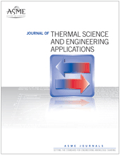
Journal of Thermal Science and Engineering Applications
Delivering cutting-edge research in thermal applications.The Journal of Thermal Science and Engineering Applications is a premier publication dedicated to advancing knowledge in the fields of thermal sciences and engineering applications. Published by the esteemed American Society of Mechanical Engineers (ASME), this journal has been contributing to the scientific community since 2009 and continues to be a platform for innovative research until 2024. With an ISSN of 1948-5085 and an E-ISSN of 1948-5093, the journal is recognized for its rigorous peer-review process and its impact within the scientific community. Notably, it has achieved notable rankings in various categories as of 2023, including Q2 in Engineering (miscellaneous) and Q3 in Condensed Matter Physics, Fluid Flow, and Transfer Processes, and Materials Science. This positions the journal favorably within its field, attracting submissions that reflect both theoretical and practical advancements. While it does not offer open access, its commitment to quality content ensures that it serves as a critical resource for researchers, professionals, and students interested in thermal sciences, engineering innovations, and related interdisciplinary studies. It is a must-read for anyone looking to stay informed on the latest developments and applications in these dynamic areas of research.

THERMAL ENGINEERING
Exploring Innovations in Thermal Processes and TechnologiesTHERMAL ENGINEERING is a premier journal dedicated to advancing the field of thermal engineering, with particular importance in the domains of Energy Engineering, Nuclear Energy, and Power Technology. Published by PLEIADES PUBLISHING INC, this esteemed journal has been providing significant scholarly contributions since its inception, with its converged years spanning from 1970 to 2024. Though currently non-open access, the journal presents a unique avenue for researchers, professionals, and students to explore groundbreaking research and innovative solutions related to energy systems and thermal processes. With a notable impact factor and positioned in the Q3 quartile for both Energy Engineering and Nuclear Energy, THERMAL ENGINEERING ensures the dissemination of high-quality research with a global reach, making it an essential resource for those looking to stay at the forefront of essential energy technologies and engineering advancements.

Journal of Thermal Science
Exploring the depths of thermal science for a sustainable future.Journal of Thermal Science is a prestigious academic publication dedicated to the field of thermal science and its applications. Published by SPRINGER, this journal has been at the forefront of knowledge dissemination since its inception in 1992 and continues to provide a platform for researchers and professionals to share their innovative findings through high-quality peer-reviewed articles. With its ISSN 1003-2169 and E-ISSN 1993-033X, the journal covers a diverse array of topics related to thermal processes, materials, and engineering, significantly contributing to advancements in Condensed Matter Physics. In the latest rankings, it holds a commendable Q2 category in the 2023 quartiles, further highlighting its relevance with a Scopus ranking of #183/434 in its field, placing it in the top 57th percentile. While currently not offering open access, the journal strives to bridge the gap between theory and practice, making substantial impacts on both academia and industry. Its continued exploration of cutting-edge research ensures that it remains a key resource for students and professionals looking to expand their knowledge and foster innovation in thermal sciences.
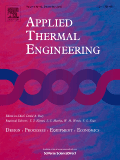
APPLIED THERMAL ENGINEERING
Driving excellence in energy and fluid dynamics research.Applied Thermal Engineering is a leading international journal dedicated to the field of thermal engineering, published by Pergamon-Elsevier Science Ltd. With an impressive impact factor indicating its significance in the academic community, this journal focuses on innovative research and developments related to energy engineering, fluid flow, and transfer processes, as well as manufacturing and mechanical engineering. Being indexed in top quartiles (Q1) across multiple categories, it ranks exceptionally well on platforms like Scopus, ensuring that contributors reach a wide and relevant audience. The journal supports both open access and subscription options, promoting the dissemination of vital research findings from 1996 to 2024. With its commitment to advancing the discipline and implementing rigorous peer-review processes, Applied Thermal Engineering serves as an essential resource for researchers, industry professionals, and students aiming to stay abreast of the latest advancements and applied methodologies in thermal science.

Case Studies in Thermal Engineering
Exploring Breakthroughs in Fluid Flow and TransferCase Studies in Thermal Engineering, published by ELSEVIER, stands as a premier platform for innovative research and analysis in the field of thermal engineering since its inception in 2013. With a robust Open Access model, this journal ensures that groundbreaking findings in fluid flow and transfer processes are readily accessible to a global audience, fostering collaboration and knowledge sharing across disciplines. Situated in the United Kingdom, the journal boasts an impressive impact factor, reflecting its status in the first quartile (Q1) for both engineering (miscellaneous) and fluid flow and transfer processes, as noted in the latest Scopus rankings. Researchers and professionals alike recognize its significance, ranking 9th out of 96 in Chemical Engineering and achieving a notable 91st percentile in its category. By publishing high-quality case studies, the journal aims to advance understanding and applications of thermal engineering principles, making it an essential resource for those looking to stay at the forefront of this dynamic field.

Archives of Thermodynamics
Pioneering Research in Thermodynamic SystemsArchives of Thermodynamics is a reputable journal dedicated to the field of thermodynamics, published by the esteemed POLISH ACADEMY OF SCIENCES. With a robust history since its inception in 2003, this journal serves as a critical platform for disseminating high-quality research aimed at advancing knowledge and technology in thermodynamic systems and processes. Recognized for its contribution to the field, it holds a Q3 ranking in the Physics and Astronomy (miscellaneous) category as of 2023, with a respectable Scopus rank of #148 out of 243, placing it within the 39th percentile. Although it follows a traditional access model, the journal's commitment to scholarly excellence ensures that researchers, professionals, and students alike can benefit from its rich archives and ongoing discussions within the scientific community. Situated in Warsaw, Poland, the journal not only reflects a regional dedication to scientific progress, but also engages with global audiences interested in the evolving landscape of thermodynamic research.
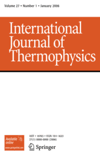
INTERNATIONAL JOURNAL OF THERMOPHYSICS
Connecting Thermal Properties with Innovative SolutionsInternational Journal of Thermophysics, published by Springer/Plenum Publishers, is a premier platform for the dissemination of high-quality research in the field of thermophysics, particularly focusing on the intricate relationships between thermal properties and their applications across various scientific disciplines. With an ISSN of 0195-928X and an E-ISSN of 1572-9567, the journal has established a respected presence in the academic community since its inception in 1980, with a converged publication timeline extending to 2024. Categorized in the Q2 quartile for Condensed Matter Physics in 2023 and maintaining impressive Scopus rankings—such as #39 in Fluid Flow and Transfer Processes and #178 in Condensed Matter Physics—the journal serves as a vital resource for researchers and professionals aiming to advance knowledge in the thermal sciences. Though not an open-access journal, it remains accessible through institutional subscriptions. The International Journal of Thermophysics is committed to fostering innovative research and interdisciplinary collaboration, ensuring that it remains at the forefront of thermophysical studies.
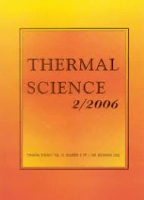
Thermal Science
Pioneering research at the intersection of thermal technology and sustainability.Thermal Science is an esteemed open-access journal published by the Vinca Institute of Nuclear Sciences in Serbia. With a rich focus on the field of thermal science, this journal has established itself as a vital resource for researchers and professionals interested in the dynamics of energy, renewable energy systems, and environmental sustainability. Since its inception in 2001, Thermal Science has dedicated itself to disseminating high-quality research that addresses the challenges of contemporary thermal technologies. The journal has converged its years of publication from 2007 to 2024 and currently holds a Q4 ranking in the category of Renewable Energy, Sustainability, and the Environment, with a Scopus rank of #172 out of 270, placing it in the 36th percentile. This makes it a crucial platform for sharing innovations and findings that contribute to the development of sustainable energy solutions. With open access options available, Thermal Science ensures that knowledge is readily accessible, fostering collaboration and advancement in this critical field.